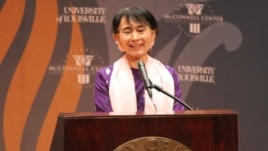(11 August 2010, by Noveline)
It has been 22 years past since the nationwide demonstration took place in Burma. People on exile have started commemorating the people, who died in the demonstration, on August 8, 2010. Those who protested went on street because of economic mismanagement and political oppression by the government. Hundreds of thousands of monks, young children, university students, housewives and doctors held demonstration against the regime in 1988. The uprising ended on September 18, after a bloody military coup by the regime killing thousands of people, including children, women and students.
So many people fled to neighbouring countries after the demonstration."I participated in the demonstration along with many other students in Yangon and fled to Thailand," said a history major student who took part in the demonstration. He had seen his friends killed in front of him.
"When I went back to Burma in 1991, I was carrying some documents given by the ethnic leaders when they arrested me. I was first sentenced to death for being accused of the State's revolutionary but my sentence was later reduced to 20 years, "he added.
After that the military regime held the election in 1990. During that election, Aung Sun Suu Kyi's party, the National League for Democracy had won but military refused to recognize the results and placed her under house arrest.
Rather than fulfilling the people's desire, the military junta controlled the people by intimidating and using torture against those who criticized them.
Furthermore, Burmese's military regime will once again hold its election some time in 2010. The election is based on the 2008 Constitution, which contains provision lacking freedom of the media and public expression. Newspapers, journals and other publications are run by the Ministry of Information which censors publications heavy before they are published.
"During the 2008 referendum, Ayng Myint Htun from the DVB was arrested because he took a photo of ballot in which there were no voting people" said Min Lwin Oo, AHRC lawyer.
As of 2010, there had already been over 2,100 political prisoners who are journalists, teachers, lawyers, students and monks who remain in prison in absence of a fair trial. "The judicial system seems like to judge whoever the police prosecute. The judicial system is paralysed" said Aung Thein, Burmese legal advisor.
In the ethnic minorities region, the military forced villagers work for them and destroys their crops to wipe out the livelihood and burn their houses. The ethnic minority had to leave their villages because of forced labor, being forcibly relocated, torture, and rape and so on.
"The military regime holding the election without changing the current situation makes it impossible to build a democratic country" Min Lwin Oo added.
The election that will be held by the government is lacking three fundamental democratic rules: independence of the judiciary, social rights and freedom of expression, concluded Min Lwin Oo.
Wednesday, August 11, 2010
Subscribe to:
Post Comments (Atom)












0 comments:
Post a Comment